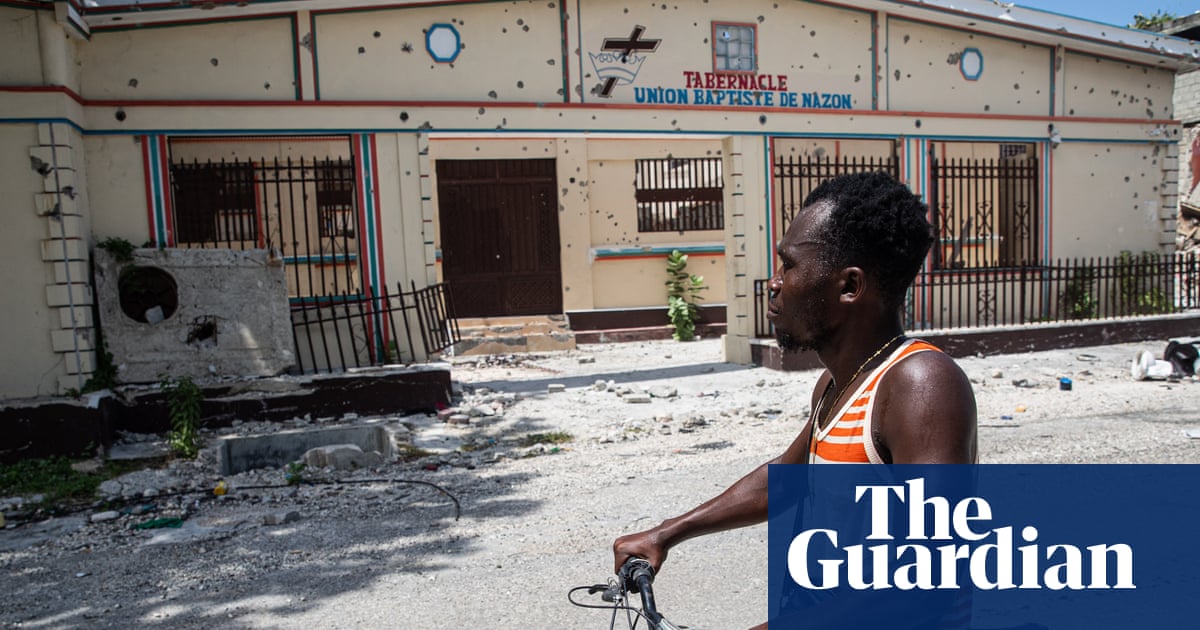Unit will have up to 5,500 soldiers and police officers who will tackle the violence that has overwhelmed the country
The United Nations has adopted a resolution to transform a security mission in gang-dominated Haiti into a larger, fully fledged force with military troops.
The new unit can now have a maximum of 5,500 uniformed personnel, including police officers and soldiers, unlike the current mission, which is just law enforcement. The US ambassador to the UN, Mike Waltz, said the vote by 12 security council members to “transform the multinational security support (MSS) mission to the new gang suppression force, a mission five times the size of its predecessor” showed the “international community was sharing the burden”.
Currently 1,000 officers, mostly from Kenya, are deployed in Haiti under the security mission aimed at supporting the Haitian police in their fight against rampant gang violence, but it has had mixed results.
“This is the face of Haiti today, a country at war, a contemporary Guernica, a human tragedy on America’s doorstep,” he added.
Saint-Cyr had thrown his support behind the US and Panamanian proposal to evolve the mission into a more resilient force for an initial period of one year. “The council can help restore peace in a nation currently suffocated by merciless gangs,” Panama’s ambassador to the UN, Eloy Alfaro de Alba, said ahead of the vote.
The US deputy secretary of state, Christopher Landau, said last week: “This mandate would empower the force to proactively target gangs and restore security to Haiti while ensuring it has the appropriate tools to succeed the mission’s anticipated objectives.”
China had expressed scepticism about the role of the mission without political transition in Haiti and abstained during the vote to create it in 2023, as did Russia. Beijing and Moscow abstained again on Tuesday’s vote.
Russia and China were both critical of Washington, accusing it of failing to stop an illicit flow of weapons to Haiti from the US and not providing enough funding for the initial mission. They also said the US had rushed through a resolution that was ambiguous on several critical issues, including rules of engagement.
“Let us be frank, if that contributor failed to provide the promised funds for the MSS, what guarantees are there that things will be different with this new mission?” said Russia’s UN ambassador, Vassily Nebenzia, describing the money needed for Haiti as very modest compared to the billions of dollars spent by countries to send weapons to Ukraine.
He also echoed concern raised by Russia’s foreign minister, Sergei Lavrov, on Saturday about how the US could interpret the gang suppression force mandate. The resolution adopted on Tuesday authorises countries taking part to take all necessary measures to carry out its mandate, meaning the use of force.
“We have no certainty that the authors of today’s text will not come up with some kind of – quote, unquote – creative way to link their military activity to allegedly combating drug cartels,” Nebenzia said.
The poorest country in the Americas, Haiti has long suffered at the hands of violent criminal gangs that commit murders, rapes, looting and kidnappings against a backdrop of chronic political instability.
The situation has worsened significantly since early 2024, when gangs drove then-prime minister, Ariel Henry, to resign. The country, which has not held elections since 2016, has since been led by a transitional presidential council.
Source: www.theguardian.com
